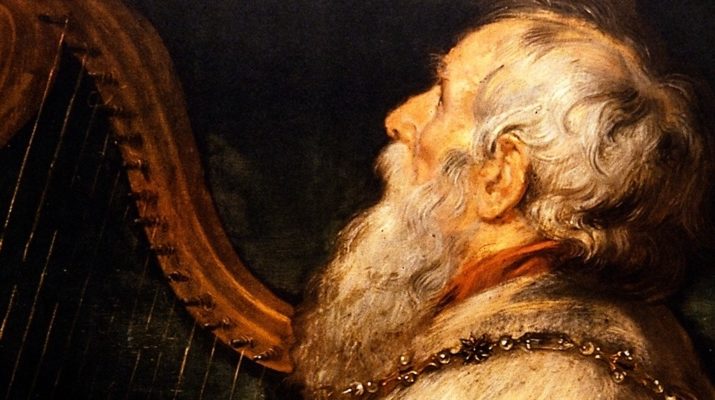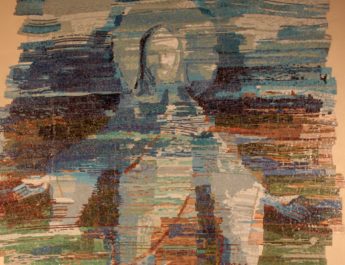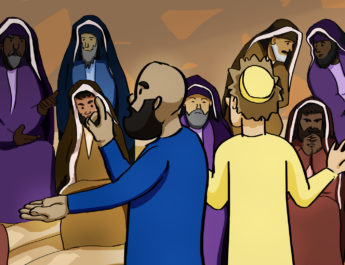2 Samuel 7:1-11, 16
Advent B4
BibleHub
1 Now when the king was settledA in his house,B and the LordC had given him restD from all his enemiesE aroundF him,
Notes on verse 1
A “settled” = yashab. This is to sit and so to remain and so to dwell. It is sitting for any reason – as a judge, in order to ambush, or just sitting quietly. Causatively, this can mean settling or marrying. This can also mean continue, endure, or establish.
B “house” = bayit. Probably from banah (to build, make, set up, obtain children; to build literally or figuratively). This is house, court, family, palace, temple.
C “Lord” = YHVH. From havah (to be, become) or hayah (to come to pass, become, be). This is the name of the God of Israel, the self-existent and eternal one, the tetragrammaton. This pronunciation has been lost to time so “Lord” is generally used in its place.
D “given…rest” = nuach. This is to rest, calm, camp, free, place, remain, satisfy, settle, station, or wait. It is rest and so implies settling down in a literal or figurative sense. This is perhaps the root verb of the name “Noah.”
E “enemies” = oyeb. From ayab (to hate or be hostile to). This is a foe or enemy as one that you are hostile to.
F “around” = sabib. From sabab (turning around, going around; to surround, cast, walk, fetch; to revolve or border in a literal or figurative sense). This is a circuit or a circle. It could refer to an environment, one’s neighbors, or a circular path round about.
2 the king said to the prophetG Nathan,H “SeeI now,J I am livingK in a house of cedar,L
Notes on verse 2a
G “prophet” = nabi. This is prophet, prophecy, speaker, or someone inspired.
H “Nathan” = Natan. From natan (to give, put, set, offer; to give literally or figuratively). This is Nathan, meaning “given” or “[God] gives.”
I “see” = raah. This is to see in a literal or figurative sense so stare, advise, think, view.
J “now” = na. This particle is used for requests or for urging. It can be we pray, now, I ask you, oh. This is the same “na” in “hosanna.”
K “living” = yashab. Same as “settled” in v1. See note A above.
L “cedar” = erez. Perhaps from araz (made from cedar; to be firm, strong). This is cedar or a cedar tree as strong.
but the arkM of GodN staysO in a tent.”P
Notes on verse 2b
M “ark” = aron. Perhaps from arah (to gather or pluck). This is a chest, box, or coffin. It is used for the Ark of the Covenant.
N “God” = Elohim.
O “stays” = yashab. Same as “settled” in v1. See note A above.
P “tent” = yeriah. From yara (to tremble, fear, quiver). This is a hanging curtain – a tent curtain that can shake.
3 Nathan said to the king, “Go,Q doR all that you have in mind;S for the Lord is with you.”
Notes on verse 3
Q “go” = halak. This is go, come, walk. It is walk literally and figuratively and includes people and animals. It can be used figuratively for one’s moral life – how we walk according to God’s way or against it. It can also refer to the walk of life as in the course one’s life takes, the choices we make, etc.
R “do” = asah. This is to make, do, act, appoint, become in many senses.
S “mind” = lebab. May be related to labab (to encourage; properly, to be encased as with fat; used in a good sense, this means to transport someone with love; used in a bad sense, it can mean to dull one’s senses). This is the heart, courage, one’s inner self, the mind, or the will. Heart is only used in a figurative sense in the Old and New Testaments.
4 But that same nightT the wordU of the Lord came to Nathan: 5 Go and tell my servantV David:W Thus says the Lord: Are you the one to buildX me a house to live in?
Notes on verses 4-5
T “night” = layil. Properly, this refers to light twisting away. It is used for night or midnight. Figuratively, this can mean adversity.
U “word” = dabar. From dabar (to speak, declare, discuss). This is speech, a word, a matter, an affair, charge, command, message, promise, purpose, report, request. It is a word, which implies things that are spoken of in a wide sense.
V “servant” = ebed. From abad (to work, serve, compel; any kind of work; used causatively, can mean to enslave or keep in bondage). This is a servant, slave, or bondservant.
W “David” = David. From the same as dod (beloved, love, uncle); the root may mean to boil, which is used figuratively to describe love. So, this implies someone you love such as a friend, a lover, or a close family member like an uncle. David’s name likely means something like “beloved one.”
X “build” = banah. This is to build, make, set up, restore, repair, or obtain children. It is to build literally or figuratively
6 I have not lived in a house since the day I brought up the peopleY of IsraelZ from EgyptAA to this day, but I have been moving aboutBB in a tentCC and a tabernacle.DD
Notes on verse 6
Y “people” = ben. This is son, age, child. It is son in a literal or figurative sense.
Z “Israel” = yisrael. From sarah (to persist, exert oneself, contend, persevere, wrestle, prevail) + el (God or god). This is God strives or one who strives with God; new name for Jacob and for his offspring. This refers to the people and to the land.
AA “Egypt” = mitsrayim. Perhaps from matsor (besieged or fortified place, bulwark, entrenchment; something hemmed in; a siege or distress or fastness); from tsur (to confine, besiege, to cramp). This is Egypt.
BB “moving about” = halak. Same as “go” in v3. See note Q above.
CC “tent” = ohel. Perhaps from ahal (to shine, be clear). This is a tent, covering, home, or side pillar.
DD “tabernacle” = mishkan. From shakan (to settle down in the sense of residing somewhere or staying there permanently; to abide or continue). This is a place where one lives – a tabernacle, tent, or other kind of dwelling. It can also be a lair where animals live, the grave, the Temple, or the Tabernacle.
7 Wherever I have moved about among all the people of Israel, did I ever speakEE a word with any of the tribal leadersFF of Israel, whom I commandedGG to shepherdHH my peopleII Israel, saying, “Why have you not built me a house of cedar?”
Notes on verse 7
EE “speak” = dabar. Related to “word” in v4. See note U above.
FF “tribal leaders” = shebet. This is a rod, staff, club, scepter, dart, or tribe. Literally a stick that can be used for punishing, writing, fighting, walking, ruling; thus, used figuratively for a clan.
GG “commanded” = tsavah. This is to charge, command, order, appoint, or enjoin. This is the root that the Hebrew word for “commandment” comes from (mitsvah).
HH “shepherd” = ra’ah. This is to tend a flock, pasture, or graze. It can mean to rule or to associate with someone. Figuratively, it can be ruler or teacher.
II “people” = am. From amam (to darken, hide, associate; creating shadows by huddling together). This is people or nation. It can be used specifically for a tribe, collectively of troops or armies, or figuratively to refer to a flock of animals.
8 Now therefore thus you shall say to my servant David: Thus says the Lord of hosts:JJ I took you from the pasture,KK from following the sheepLL to be princeMM over my people Israel;
Notes on verse 8
JJ “hosts” = tsaba. From tsaba (to wage war, serve, assemble, fight, perform, muster, wait on). This is a large group of persons (used figuratively for a group of things). It implies a campaign literally as with army, war, warfare, battle, company, soldiers. Can also be used figuratively for hardship or for worship.
KK “pasture” = naveh. From navah (home, beautify, praise) This is home, place where shepherd or sheep live. It is at home – implies a lovely place or a place of satisfaction. It can also be used for the Temple or a pasture as the home of wild animals.
LL “sheep” = tson. This is a flock of sheep and goats.
MM “prince” = nagid. From nagad (this is to declare, make conspicuous, stand in front, manifest, predict, explain). This is a commander or leader as the one who stands at the front, whether in a military, religious, or civic setting. It can also mean honorable or noble in an abstract sense.
9 and I have been with you wherever you went, and have cut offNN all your enemies from beforeOO you; and I will makePP for you a greatQQ name,RR like the name of the great onesSS of the earth.TT
Notes on verse 9
NN “cut off” = karat. This is to cut down, cut off, or make a covenant (idiom for making a covenant is “to cut a covenant”). It can also mean to destroy, fail, or consume.
OO “before” = paneh. Literally “from your face.” From panah (to turn, face, appear). This is face in a literal or figurative sense. It could be face, presence, anger, respect. It can also be used of God to indicate divine favor or presence.
PP “make” = asah. Same as “do” in v3. See note R above.
QQ “great” = gadol. From gadal (to grow up, become great, become wealthy – to advance. The root meaning may be to twist in the sense of the process of growing). This is great, high, bigger, noble, old, marvelous. It can also refer to someone who is powerful or distinguished.
RR “name” = shem. May be from sum (to put, place, set). This is name, fame, renown. A name was thought to indicate something essential about a person – something about their individuality. So, this word can also mean honor, authority, or character.
SS “great ones” = gadol. Same as “great” in v9. See note QQ above.
TT “earth” = erets. Root may mean to be firm. This is earth, ground, field land, or country.
10 And I will appoint a placeUU for my people Israel and will plantVV them, so that they may liveWW in their own place, and be disturbedXX no more;
Notes on verse 10a
UU “place” = maqom. From qum(to arise, stand, accomplish, establish, abide; rising against, getting up after being sick or asleep, arising from one state to another, becoming powerful, or rising for action; standing in a figurative sense). This is a standing, which is to say a spot or space a place. It can also refer to a locality or a physical/mental condition. HaMaqom is also a Jewish name for God – the place, i.e. the Omnipresent One.
VV “plant” = nata. To fix or fasten, establish or plant. This is planting in a literal or figurative sense.
WW “live” = shakan. Related to “tabernacle” in v6. See note DD above.
XX “be disturbed” = ragaz. This is shaking from any strong emotion, particularly anger or fear. It can be agitated, excited, perturbed, afraid, quaking, quivering.
and evildoersYY shall afflictZZ them no more,AAA as formerly,BBB
Notes on verse 10b
YY “evildoers” = ben + evel. Literally “children of wickedness.” Ben is the same as “people” in v6. See note Y above. Evel is perhaps from aval (to deal unjustly, act in a wrongful way, a wrongdoer). This is injustice, wrong, moral evil, acts of violence, or unrighteousness.
ZZ “afflict” = anah. This is to be bowed down. It can refer to a sense of humility or to a sense of being browbeaten, oppressed, afflicted, or depressed. This can be literal or figurative – depressed in mood or circumstance.
AAA “more” = yasaph. This is to add, increase, continue, exceed.
BBB “formerly” = rishon. From rishah (beginning or early time); from rosh (head, captain, or chief; excellent or the forefront; first in position or in statue or in time). This is first, former, ancestor, beginning, ranked first.
11 from the timeCCC that I appointedDDD judgesEEE over my people Israel; and I will give you rest from all your enemies. Moreover the Lord declaresFFF to you that the Lord will make you a house.
Notes on verse 11
CCC “time” = yom. Literally “day.”
DDD “appointed” = tsavah. Same as “commanded” in v7. See note GG above.
EEE “judges” = shaphat. This is to judge, defend, pronounce judgment, condemn, or govern. It can refer to God judging or to human judges. This is pronouncing a verdict in favor or against so it implies consequences or punishment. It can also mean to litigate or govern as one with authority.
FFF “declares” = nagad. This is to declare, make conspicuous, stand in front, manifest, predict, explain.
16 Your house and your kingdomGGG shall be made sureHHH foreverIII beforeJJJ me; your throneKKK shall be establishedLLL forever.
Notes on verse 16
GGG “kingdom” = mamlakah. Related to “king” in v1. From the same as melek (king, royal). This is kingdom, dominion, sovereignty, rule. It can also refer to the realm.
HHH “made sure” = aman. This is to believe, endure, fulfill, confirm, support, be faithful. It is to put one’s trust in, be steadfast. Figuratively, this is to be firm, steadfast, or faithful, trusting, believing, being permanent, morally solid. This is where the word “amen” comes from.
III “forever” = olam. This is a long scope of time whether in the past (antiquity, ancient time) or in the future (eternal, everlasting).
JJJ “before” = paneh. Same as “before” in v9. See note OO above.
KKK “throne” = kisse. From the same as kese (full moon); perhaps from kasah (to cover, conceal, overwhelm; to cover as clothes do or to hide a secret). This is throne – a seat that is covered or has a canopy. Thus, it is a seat that conveys authority.
LLL “established” = kun. Properly, this means in a perpendicular position. So, it is set up in a literal sense – establish, fix, fasten, prepare. In a figurative sense, it is certainty, to be firm, faithfulness, render sure or prosperous.
Image credit: “King David” by Peter Paul Rubens.




